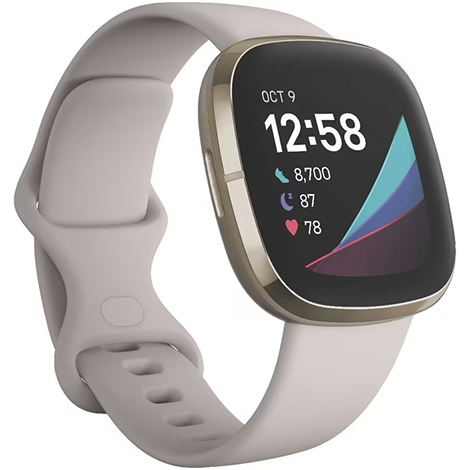Whatever your goals may be, fitness trackers can be great tools for getting more active, sleeping better, and gaining more insight into your overall health. They’re also helpful when it comes to tracking your progress and figuring out how hard you should be pushing yourself.
Any good fitness tracker will be able to measure your heart rate, read your blood oxygen levels, assess your sleep health, and join you while you swim. Some fitness trackers can even play music, answer messages, and pay for your morning coffee.
With so many options on the market, choosing a fitness tracker to suit you can be tricky, so let us help you narrow down the right one for your needs.
Which fitness tracker has the best features?
It’s no surprise that Apple has made one of the most popular fitness trackers to date with the Apple Watch Series 7. With its excellent heart rate accuracy, its high-quality GPS technology, and its compatibility with other iOS devices, it’s an obvious first choice if you have the money. Let’s dive a little deeper into why this series is the best one.

The App Store is packed full of popular yoga, wellness, and gym apps for you to choose from and install onto the Apple Watch. Or, if you’re happy to pay the subscription and have the means to work out from home, you can have a go of Apple’s own Fitness+ service. Play video workouts on your TV or iPad and view your stats on-screen, thanks to Apple’s best-in-class heart rate accuracy and high-quality GPS.
Apple’s Fitness+ service is well-suited to casual exercisers, while the near-peerless support for third party platforms caters to the more experienced exercisers too. One thing you should consider, however, is the battery life that delivers up to 18 hours of use between charges, requiring daily or every-other-day charging.
Which fitness tracker is the best for stress management?
The Fitbit Sense doesn’t offer the same high-end features as other trackers do, but it does offer some handy selling points that are unique amongst fitness trackers. The in-built EDA scanner measures stress levels by reading how sweaty your hands are and, if it senses that you’re feeling overwhelmed, it will suggest meditation practices. Fitbit Sense also comes with an ECG scanner that offers insight into your heart health and will send alerts if it finds your heart rate unusually high or low.

Like others on the market, the tracker has a ‘Daily Readiness’ score that guides you when it comes to pushing yourself during exercise sessions. At times when you haven’t had enough sleep or have pushed yourself at the gym, Fitbit Sense will tell you to rest for the day. The score will adjust and adapt as the tracker gets used to its wearer’s routine and pattern.
Design-wise, Fitness Sense has a large screen with an easily read display, even in sunlight, and a battery life of up to 6 days. It’s not clunky, so you can wear it while you sleep to keep track of your rest. One downfall is that it doesn’t allow you to download and listen to music unless you’re using Deezer or Pandora.
Which fitness tracker has pre-loaded exercises?
The Garmin vivoactive 4 is the perfect balance of fitness tracker and stylish smartwatch. It offers a sleek touchscreen and utilises an LCD display to save on battery life. You can add a variety of third-party apps through the Garmin Connect IQ store, plus it comes with built-in music storage with Spotify support.

The vivoactive 4 comes in 2 sizes (45 mm and 40 mm) and has almost every feature you could want in a fitness tracker.
Along with Garmin’s industry-leading features for fitness tracking and recovery, the vivoactive 4 comes pre-loaded with exercises, including yoga and Pilates, which play as guided animations directly on the tracker’s screen.
What are the best health & fitness apps for Android?
Endomondo is a popular fitness app that offers a free version or a subscription-based premium version. It lets you track your fitness data and works with your tracker’s heart rate monitor to present your data in a thoughtful manner. It also analyses your data to bring you a daily diary and lets you share your fitness plans with friends.

Another popular app is Google Fit, which works smoothly with Android interfaces. The app shows you steps taken and has cards for your heart rate measurements, goal setting, and cycling and running data. The best part about Google Fit is that it lets you integrate data from your third-party fitness apps too, giving you all your health data on one screen.
Lastly, the Calm app is one of the most popular options for meditation, stress management, and wellness. It offers a range of guided breathing exercises, as well as a mood check-in feature that helps you to track your current moods with the help of emojis and labels.
What are the best health & fitness apps for Apple Watches?
The Fiit app lets you stream hundreds of workouts with options like HIIT, strength training, yoga, and more. You can start a workout on your iPhone and your heart rate will come up on your Apple Watch, along with a leader board on the next screen.

Another app that helps you to track your fitness via your Apple Watch is Runkeeper, which lets you start the app straight from your wrist. Once you’ve started running, you can check several stats, including overall time, distance covered, and pace.
Gymaholic is an app that uses AR to create an avatar which you can customise to suit your sex, height, and body fat percentage. After a workout, your avatar will show all the muscles you trained and also shows which muscles are ready for training. Plus, during your workout, it displays various stats like reps, weight, heart rate, and calories alongside your avatar.
or complete our form today to set up an appointment with a computer repair technician




